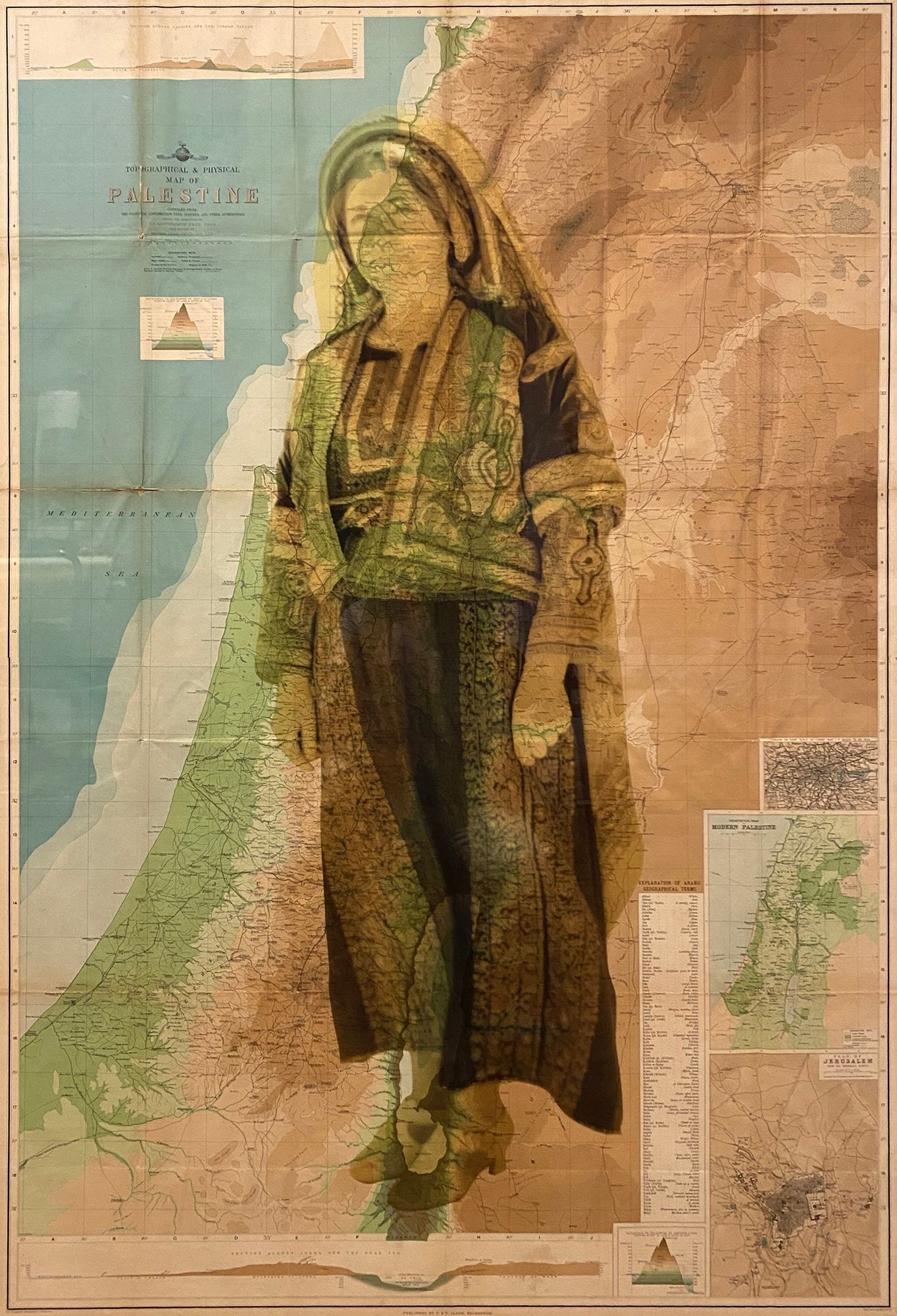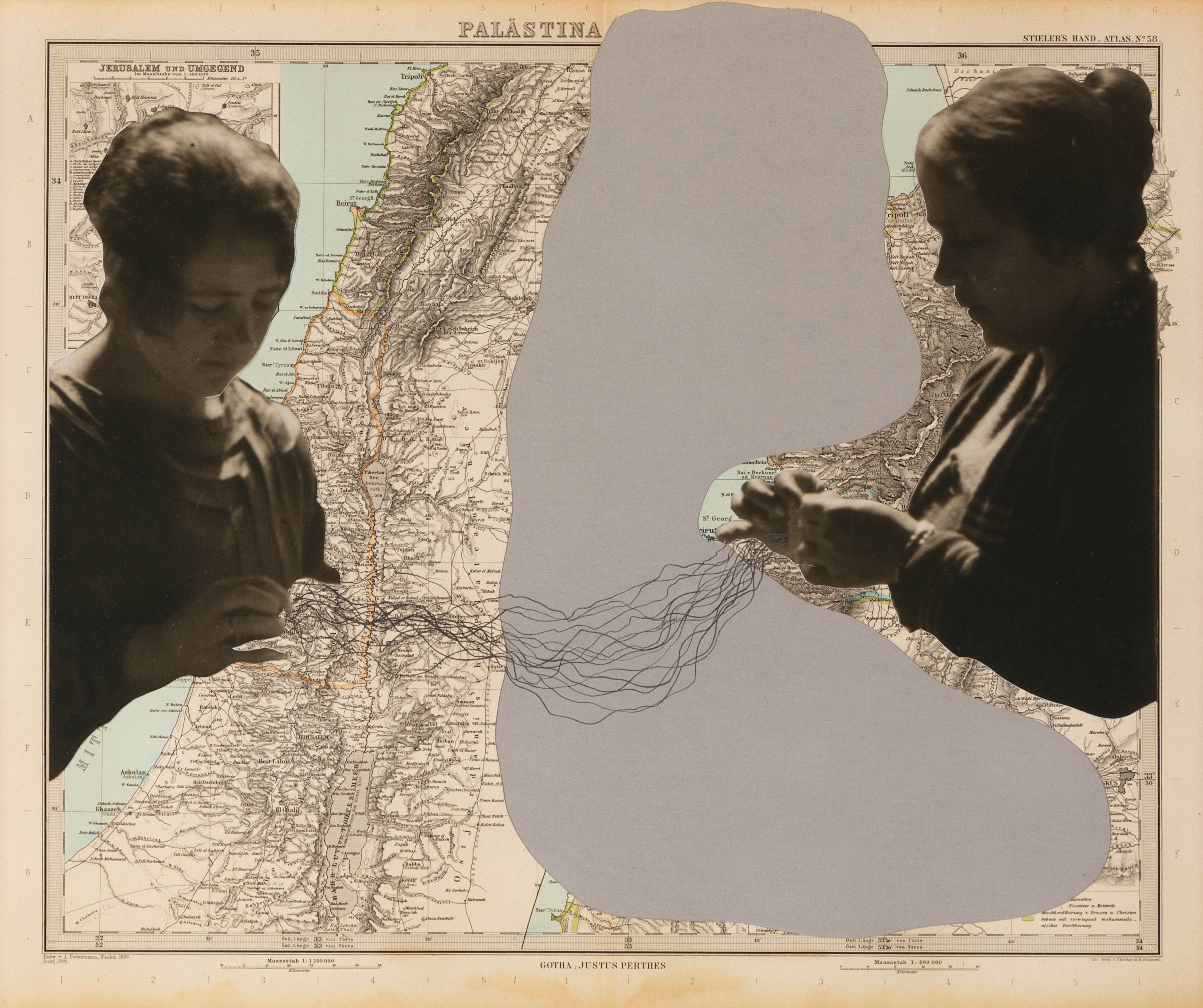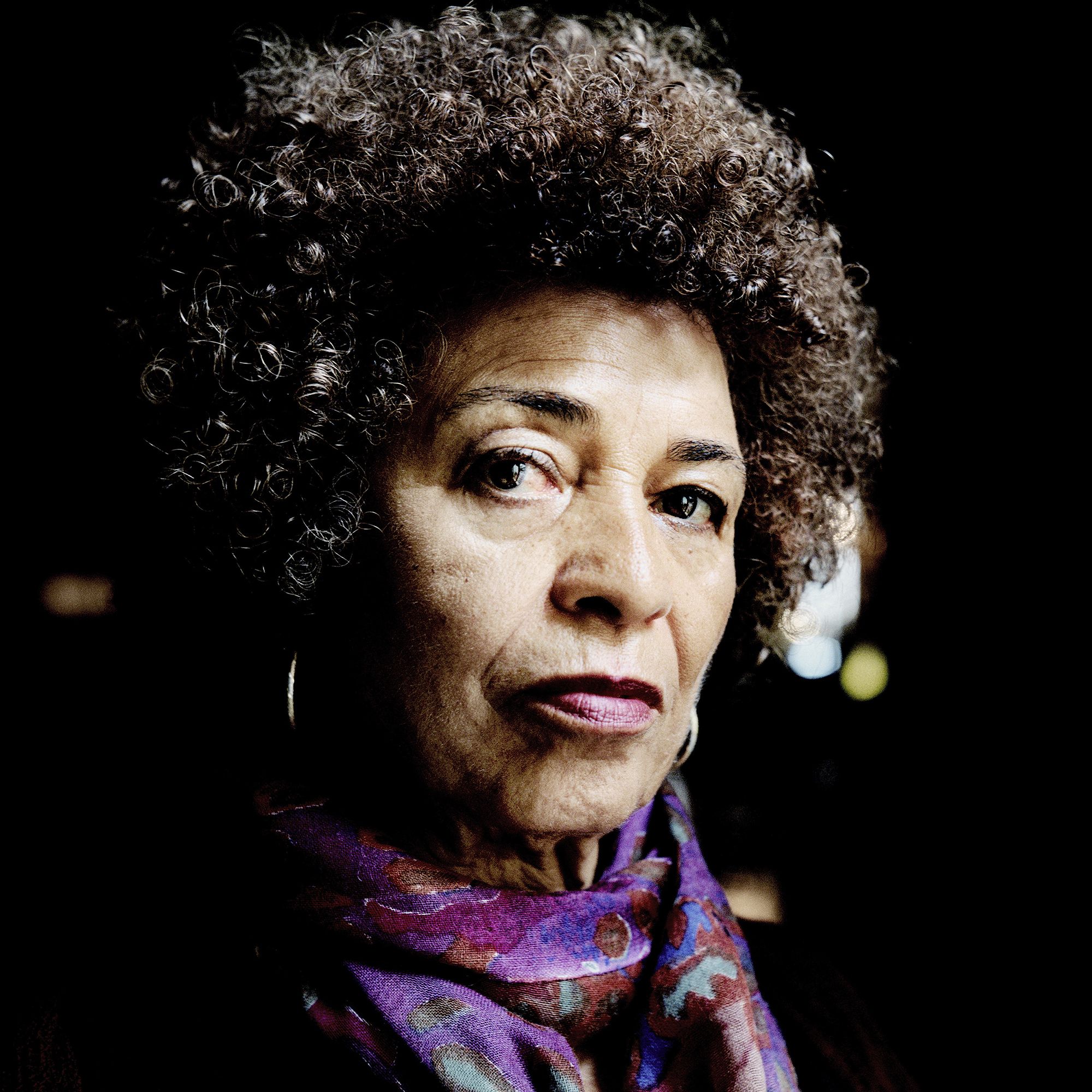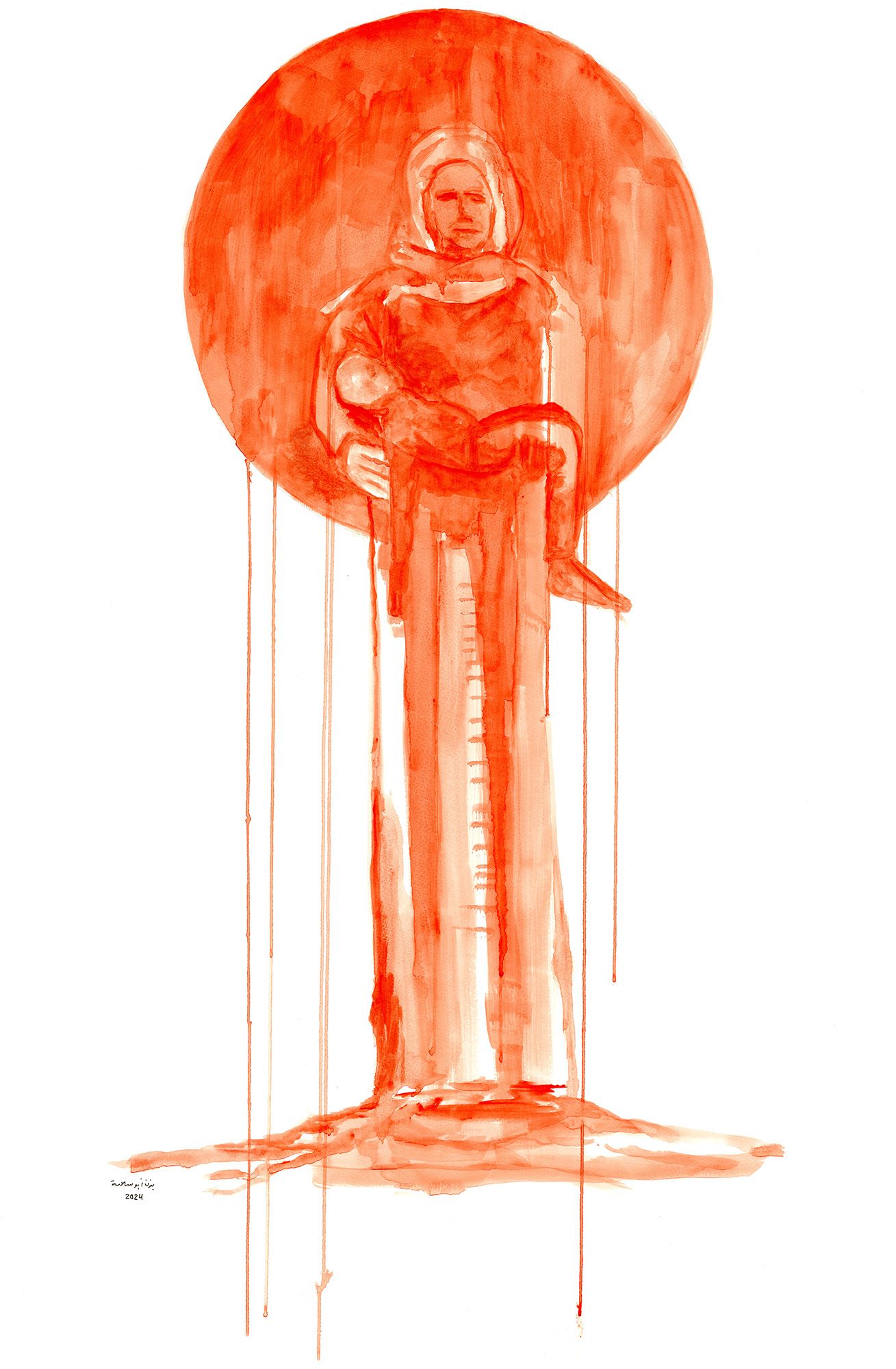No. 3
Spring 2024
Anti-Arab Racism and the U.S. and Israeli War Machines
The West’s dehumanization of Arabs has helped to normalize war crimes.

Hazem Harb, The Mother Land, 2023.
The state of Israel has unleashed the most brutal military bombardment since World War II on the Palestinians of the Gaza Strip. This siege came in response to Hamas’s breach of the wall that delineates the Israeli occupation and the group’s subsequent attacks on Israeli soldiers and civilians.
Israel’s more than 45,000 air strikes since October have far exceeded the nearly 15,000 air strikes the U.S. carried out on Iraq in its campaign against the Islamic State from 2014 to 2017. In December, U.S. intelligence sources divulged to CNN that 40 to 45 percent of the 29,000 missile strikes against Gaza were “dumb bombs,” or unguided missiles, which can be more dangerous to civilians in densely populated areas.
“When a 3-year-old girl is killed in a home in Gaza, it’s because someone in the army decided it wasn’t a big deal for her to be killed — that it was a price worth paying in order to hit [another] target,” an Israeli military source told reporters as part of a bombshell report attributing the virulence of Israel’s assault in part to an increased reliance on artificial intelligence to generate targets. “Everything is intentional. We know exactly how much collateral damage there is in every home.”
Intense anti-Arab racism, Islamophobia, and what the Palestinian American intellectual Edward Said described as “Orientalism” have underwritten the West’s perpetual wars, sieges, and onslaughts against the Middle East, wars that America’s client state, Israel, has helped manage for multiple generations. This racism has normalized America’s and Israel’s war crimes in the Middle East.
But this is far more than a simple ideological project. As the largest recipient of U.S. aid in the region, to the tune of more than $3 billion each year, Israel has long been of use to the West as the Zionist project of building a state on the dispossession of the indigenous Palestinian population. The U.S. disguises its geopolitical designs to control access to the region’s oil supply under the guise of rooting out terrorism. Though America’s “war on terror” failed, its afterlife of security theater, surveillance, and abject racist demonization of a perpetual Arab or Muslim “other” lives on.
Soon after Israel began its siege, Joe Biden made a mockery of Palestinian grief and death. “I have no notion that the Palestinians are telling the truth about how many people are killed,” he said, echoing the Israeli government. His statement recognizing 100 days of the war on Gaza made no mention of the thousands of Palestinians whom Israel had killed. More recently, Biden enjoyed an ice cream cone with a late-night talk show host while blithely suggesting the possibility of a cease-fire. A week later, The Washington Post revealed that the United States has quietly delivered 100 weapons packages to Israel over the course of its assault, including thousands of precision-guided munitions, small-diameter bombs, and bunker busters.
Of course, the U.S. has long licensed Arab death. Consider the Clinton era. In 1996, when Lesley Stahl on “60 Minutes” asked UN Ambassador Madeleine Albright about the deaths of half a million Iraqi children caused by U.S.-backed sanctions on Iraq, Albright infamously said, “The price is worth it.” Activists confronted her the next year, and she responded, “I am as concerned about the children in Iraq as any person in this room.” But, she added, “Saddam Hussein is the one who has the fate of his country in his hands. … He is the one responsible for starving children, not the United States of America.”
George W. Bush claimed after the attacks on Sept. 11 that “the face of terror is not the true faith of Islam,” and “Islam is peace.” But the indiscriminate targeting of Arabs and Muslims abroad through various war efforts and domestically by federal and local police during the Bush presidency contradicted such overtures. The federal government’s gearing up for war reverberated across the country and fomented an atmosphere of fear, anxiety, and extraordinary racism. Polls taken soon after Sept. 11 found 58 percent of Americans supported “intensive security checks” for Arabs, 49 percent favored special identification cards for them, and 32 percent approved of “special surveillance” of Arabs.
The media played a significant role in providing bigoted justifications for racial profiling. Richard Cohen, then a columnist for The Washington Post, argued: “We have become driveling idiots on matters of race and ethnicity. One hundred percent of the terrorists involved in the Sept. 11 mass murder were Arabs. Their accomplices, if any, were probably Arabs, too — at least Muslims. Ethnicity and religion are the very basis of their movement. It hardly makes sense, therefore, to ignore that fact and, say, give Swedish au pair girls heading to the United States the same scrutiny as Arab men coming from the Middle East.”
Indeed, less than a month after the attacks, Bush sang a different tune from his earlier overture:
They hate us because we love the idea that people can worship an Almighty God any way he or she sees fit. They hate us because we love political discourse and a free society. They hate us because of our free press. They hate everything about us, because of our freedom. And there’s another — there are a lot of distinguishing features, but one of the most clear ones to me is this: We value life in America. We say everybody is precious, everybody counts, every life has worth, every life has dignity. They don’t value life.
An emboldened American security state was activated. In the weeks after Sept. 11, the FBI and other law enforcement agencies rounded up and detained more than 1,200 people, mostly Arabs and Muslims. The Department of Justice initiated a program of “voluntary interviews” with 5,000 “non-immigrant” men who claimed citizenship from countries the U.S. insisted harbored Al Qaeda. Two years later, in preparation for war with Iraq, a new Iraqi Task Force, created by the FBI, interviewed 11,000 people of Iraqi origin living in the United States, many of them citizens.
The swell of anti-Arab suspicion and racism shaped the lead-up to America’s baseless war of aggression against Afghanistan and Iraq. Politicians’ xenophobia obscured the brutality of a war that killed between 150,000 and perhaps as many as 600,000 Iraqis. The widespread destruction of civilian infrastructure, already weakened by a decade of brutal U.S.-backed sanctions, resulted in even more deaths of Iraqis. It also helped to foment the conditions that allowed for the creation of the U.S. gulag in Guantánamo Bay — a military space controlled by the U.S. absent any rights or freedom. The climate of war allowed for torture and abuse of detainees at Abu Ghraib, too. Tens of thousands more were killed in Afghanistan — the longest war in U.S. history, ending only in 2021.
According to a 2023 report from Brown University, researchers estimated that more than four million people were either killed or eventually died in the War on Terror. From Afghanistan to Iraq, Syria, Libya, Somalia, and Yemen, millions have died from what The Washington Post described as “waves of violence, hunger, the devastation of public services, and the spread of disease.” In fact, it was anti-Palestinian bigotry that drove the creation of and shaped the development of anti-terrorism laws, according to a new report by Palestine Legal and the Center for Constitutional Rights. In 1969, the first-ever mention of terrorism in a federal law “dealt specifically with restricting humanitarian aid to Palestinians and inaugurated a pattern of rendering Palestinians synonymous with terrorism.”
The characterization of Arabs and Muslims as forever enemies was built into politics and disseminated through popular culture, which endlessly portrayed brown-skinned men as terrorists.
Republicans have long worn their derision of Arabs and Muslims openly. The far right concocted a mass hysteria over the conspiracy theory that Muslims sought to implement Shariah law in the U.S. Since 2010, state legislatures have introduced at least 201 anti-Shariah bills. Breaking with longstanding international consensus, Trump moved the U.S. embassy from Tel Aviv to the contested land of Jerusalem. And he implemented a ban on entry into the United States from a handful of majority Muslim countries after he was inaugurated as president, a ban the Supreme Court upheld. More recently, in the weeks after Hamas’s attacks, Montana Representative Ryan Zinke introduced legislation (with 10 cosponsors) that would ban Palestinians from entering the United States. “I don’t even want to call it the Palestinian flag because they’re not a state,” Republican Representative Max Miller of Ohio complained after Michigan Representative Rashida Tlaib pinned a Palestinian flag to her office door. “They’re a territory that’s about to probably get eviscerated and go away here shortly, as we’re going to turn that into a parking lot.”
We have come to expect such racist dreck from the Republican Party. But this is the Democratic Party’s war. Democrats have mastered the art of performing grief even while Biden’s intersectional and multiracial cohort of UN ambassadors and functionaries oppose cease-fire resolutions that could immediately end the war. When Tlaib spoke out early in favor of a cease-fire and for an end to Israeli atrocities in Gaza, Biden press secretary Karine Jean-Pierre, a queer Haitian American, described as “repugnant” and “disgraceful” statements from Tlaib and others in the Squad calling for a cease-fire or criticizing Israel.
Meanwhile, Nancy Pelosi told Palestine solidarity protesters to “go back to China” and declared that calls for a cease-fire are “Mr. Putin’s message.” As if time-traveling back to the Cold War, she pressed on without evidence. “This is directly connected to what he would like to see,” she said. “Some of these protesters are spontaneous and organic and sincere,” but others “are connected to Russia.” Kathy Hochul, the Democratic governor of New York, joked that if Canada attacked Buffalo, N.Y., in the way that Hamas attacked Israel on Oct. 7, “there would be no Canada” — an apparent endorsement of collective punishment and the right of Israel to annihilate Gaza.
Beyond such crass rhetoric, in early February, 46 Democrats voted for a $17.6 billion aid package put forth by Republicans to finance Israel’s siege of Gaza; it failed to pass. Instead of pressuring Israel to allow more aid trucks into Gaza, which is on the brink of famine, the Biden administration has dropped parachutes of food aid, some of which failed to open midair, killing people upon landing, and rushed to create a temporary port off Gaza’s coast for humanitarian aid shipments, a theatrical, cumbersome workaround.

Hazem Harb, Map of Land Series, #4, 2019.
But we are in a new moment. For the short life of this war, millions across the globe have roared in opposition, demanding a cease-fire, along with medical aid and food for Palestinians. The protests spurred a campaign spearheaded by South Africa at the International Court of Justice to make a surprising intervention, holding that Israel’s actions may constitute genocide. Opposition to Israel’s siege has activated a Palestine solidarity movement in the U.S. led largely by Palestinian Americans and young Jews. U.S. financing and arming of this war has made Biden politically vulnerable even as he continues to stand by it.
Biden’s polling among Arab Americans voters has plummeted from 59 percent to 17 percent, while progressives have threatened to withhold their votes in the fall’s presidential contest. His political future is further imperiled by widespread opposition to Israel’s actions in Gaza among Democratic voters, especially the young. Most recently, tens of thousands of Democratic Party primary voters in Michigan, Minnesota, and elsewhere voted “uncommitted” as a protest vote against Biden’s Gaza policy. The Democratic establishment downplayed the Michigan vote in public, but when Vice President Kamala Harris was dispatched to commemorate the 59th anniversary of the Selma civil rights march, she called for an “immediate cease-fire,” then paused for applause, “for at least the next six weeks.” Of course, the movement demands an immediate and permanent cease-fire and an end to the occupation. Harris’s use of “cease-fire” instead of Biden’s “pause” is the administration’s effort to co-opt an antiwar movement that has spiraled beyond their control or their imaginations. But that rhetorical shift is also evidence that the “uncommitted” movement is unsettling the party’s consensus, as was Senator Chuck Schumer’s surprising excoriation of Benjamin Netanyahu in a speech.
Palestinians have challenged the U.S.-Israeli war machine. The U.S. war in Vietnam was the first to be broadcast widely in the homes of Americans, and the Israeli onslaught in Gaza is the first genocide to be watched live on people’s smartphones across the globe. The sheer determination of the Palestinian people to document their own suffering has transformed our understanding of this lopsided war, slicing through state-generated propaganda that has, since Vietnam, sought to shield the public from the death and destruction that is the reality of all war.
As the West has moved toward remote war conducted by drones, the human costs have become more abstract. Mainstream media outlets reinforce that remove, refusing to show the extent of the carnage, obliquely sanctioning the dubious claims of “smart bombs” and other euphemisms meant to assuage the public’s concern about the deaths of innocents. Because Israel has locked Gaza’s doors, courageous Palestinian journalists have risked their lives to broadcast Israel’s atrocities, and dozens have died doing so. It is because of Palestinians that we know of the hunger they are experiencing, visible in the gaunt bodies of their children. We know of the sniper attacks outside hospitals, the bombings of residential housing, mosques, and universities. Palestinians have learned how to circumvent the mainstream media’s equivocation about the value of their lives. They have seized the technology to show the world the consequences of Israel’s actions. Activists around the world emulated those techniques to document global movements like Occupy, the Arab Spring, Fees Must Fall, and the Black Lives Matter movement during the Ferguson uprising in 2014.
But today it is not only Palestinians who document their genocide in real time. For months, Israeli soldiers have filmed their atrocities. There are the group selfies of soldiers huddling, smiling in the foreground of the smoldering remains of apartment buildings and neighborhoods. Male Israeli soldiers fondling the underwear and nightwear of Palestinian women. A soldier in a tank bragging about running over a Palestinian man. Israeli soldiers beating, degrading, belittling Palestinians on camera, as if to showcase their hatred as well as their imperviousness to human rights, international law, or the rules of warfare. Israel has made a mockery of all of it, as settlers build illegal housing units across the West Bank at record pace, murdering Palestinians in the process and arresting thousands to be held in indefinite detention. In doing so, it has betrayed the fake piety of U.S. officials who defend Israel’s every action while deflecting queries about a cease-fire or humanitarian aid for Palestinians. That these bureaucrats feel obliged to explain this particular foreign policy is because of the mass movement and Palestinians who, from a tiny strip, occupy the center of its moral universe.
The longevity of the Palestinian movement in Gaza and beyond allowed a core of activists to immediately jolt into action after Israel began to strike Gaza. Student activism organized around the boycott, divestment, and sanctions (BDS) campaign has been a staple of the Palestinian solidarity movement for years. Now there are almost 100 new Faculty for Justice in Palestine chapters. The political atmosphere is still charged by a decade of Black Lives Matter activism and just three years removed from the paroxysmal marches in the summer of 2020. Solidarity activism replaced the political ennui brought about by an adrift Biden administration.
Even as young Jews and many of their parents have rejected Israel’s war, Israel’s propaganda machine has denounced the movement as antisemitic. Those accusations have created an academic year like no other, with student activists taking courageous action week to week, while being doxxed by right-wing activists and surveilled by paranoid college administrators. The punishment of Palestinian solidarity and activism can’t be attributed only to “Islamophobia.” In the U.S., Zionists and conservatives attack the language of decolonization along with Palestinian demands for self-determination, as captured in the old slogan “From the river to the sea,” as antisemitism. (The far-right Likud party used a version of that slogan in its original platform.) They seek to marginalize and ban Palestinian solidarity on college campuses. Here, the work of the right, liberal college administrators, and the donor class converge. There is little doubt that antisemitism is on the rise. But its ascendance must be understood alongside the simultaneous growth of anti-Arab racism and Islamophobia that Israel’s ruthless assault on Gaza has encouraged, and fear of the loss of a significant portion of young Jews for the Zionist project.
Today, the reputation of the United Nations is in tatters because of both Israel’s relentless criticism of the organization and America’s ability to unilaterally undo the sentiment of a body that claims to represent the international community. Of course, the U.S. has always used or ignored the UN for its own purposes, but never under a spotlight this searing. Consider how the U.S. relied upon the UN to launch its illegal war in Iraq after the specious claim that the country harbored weapons of mass destruction. As the world longs for a cease-fire, we all watch in astonishment as U.S. Ambassador Linda Thomas-Greenfield erases the will of the world with a mere wave of her hand.
What will become of international law as Israel continues to flout every postwar convention intended to constitute a new global order based on human rights in the aftermath of the Holocaust? All were intended to prevent exactly the kinds of atrocities that Israel is carrying out in Gaza. Of course, we have never enjoyed such a global peace. The global north instrumentalized these legal frameworks to police and control the global south. But now the emperor has no clothes — the hypocrisy of Israel’s barbarism, bankrolled by the United States, has been exposed before a global audience not just on the internet but in the Hague itself, the embodiment of the supposed sacrosanctity of international law.
Israel is a state forged in the aftermath of the traumatic experience of the Holocaust. But it has long weaponized this trauma and displaced it from Europe onto Arabs. In this siege, Israel is not satisfied with only territorial conquest and the defeat of its enemies; its military and state leaders also seek to torture, humiliate, and revel in the murder of Palestinians and the ruin of Palestinian society. Despite the gruesome suffering of Gazans, in a December poll of Israeli Jews that asked “to what extent should Israel take into consideration the suffering of the civilian population of Gaza when planning the continuation of the fighting there,” over 80 percent said a very small or fairly small extent. Nearly 75 percent of Israeli Jews supported the invasion of Rafah in a March poll. Israel projects its own violence and hatred onto Palestinians in an orgy of racism, mass murder, and wanton destruction, while Western states, led by the United States, claim to be powerless to stop this madness.
But even amid a powerful backlash that conflates demands for a cease-fire and support of Hamas’s attacks, the power of Palestinians has propelled a global antiwar movement and in turn made the Western world finally see them and their righteous demands for freedom as legitimate — even urgent. No one in any country that has been colonized or invaded or occupied by Western imperialism needs to be told about either the atrocities or the hypocrisies of the world’s greatest democracies. Vietnam, India, Congo, Namibia, Mexico, Brazil, Chile, Iraq, Yemen, Egypt, Belfast, and beyond do not need to be reminded of the compromised freedom of imperial democracy. Their own colonial and imperial histories, and their legacies of resistance, are being remembered by and for a new generation.
In the United States, disapproval of Biden’s handling of the Israeli-Palestinian conflict continues to rise — now among 79 percent of Republicans and 30 percent of Democrats. According to one poll, a stunning 67 percent of Americans support “calling for a permanent cease-fire and a de-escalation of violence in Gaza,” including 56 percent of Republicans. This may not translate into immediate support for Palestinian freedom, but Palestinian liberation is being seen in the new light of day.
This is the challenge for the left now, the one we are all focused on and the one we must think most sharply about. We are living through a revival of internationalism and another extended moment of mass protest. Even as we tire in the face of exhausting odds, a hulking imperial ship that refuses to acknowledge our power as it trembles, we must persist. A victory against the systems that oppress Palestinians is a victory against the systems that oppress us all. We hope this special edition of Hammer & Hope on Palestine provides some measure of the history, politics, and solidarity needed to support any liberation movement in its quest for freedom.
Next Article



